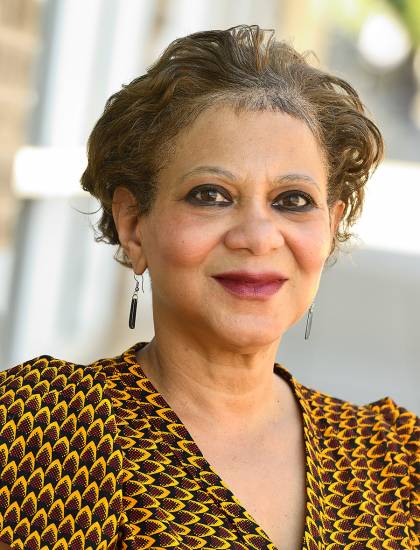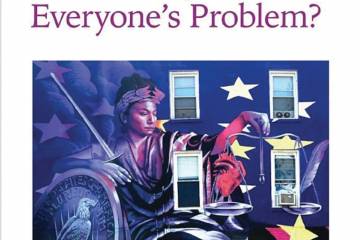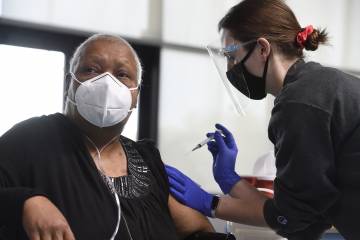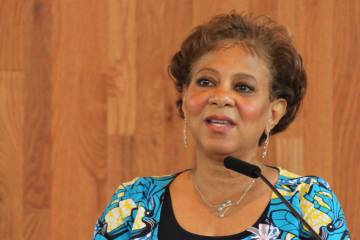- Name
- Jill Rosen
- jrosen@jhu.edu
- Office phone
- 443-997-9906
- Cell phone
- 443-547-8805
Lisa Cooper, a pioneering public health disparities researcher, general internist, and professor at Johns Hopkins University, has been appointed by President Joe Biden to the President's Council of Advisors on Science and Technology, or PCAST, the White House announced today.

Image caption: Lisa Cooper
She is one of 30 individuals named to the council, one of the most prominent and distinguished White House advisory panels, counseling the president on developments related to science, innovation, and technology, including health and medicine. In an executive order establishing the council earlier this year, Biden highlighted the group's role in providing pivotal scientific and technological data-driven expertise to inform his administration's evidence-based decision making.
"I join all my Johns Hopkins colleagues in celebrating Dr. Lisa Cooper's well-deserved appointment to PCAST. At a moment when the COVID pandemic has once again exposed the devastating impact of health care disparities, Dr. Cooper brings to her new role decades of pioneering contributions to the field of health care equity and an enduring commitment to uniting bracing research with effective policy and impactful community-based initiatives to ensure equal dignity, opportunity and flourishing for all," JHU President Ron Daniels said. "We are truly honored to have Dr. Cooper as part of our Hopkins academic community. She will be an extraordinary addition to the renewed and reinvigorated PCAST as she and her peers take up society's greatest scientific and technological challenges and help build a safer, healthier, and more equitable nation and world."
Today, @POTUS announced his President's Council of Advisors on Science and Technology (#PCAST). It's an amazing group, consisting of 30 of the nation's top scientists & technologists, charged with advising the President and @WhiteHouse on S&T. (1/7) pic.twitter.com/MJaqA6LzSq
— Eric Lander (@EricLander46) September 22, 2021
Cooper is a professor in the Department of Health, Behavior and Society at the Johns Hopkins Bloomberg School of Public Health and a Johns Hopkins University Bloomberg Distinguished Professor at the schools of Medicine, Nursing, and Public Health. She is also the James F. Fries Professor of Medicine at the School of Medicine.
Cooper is the founder and director of the Johns Hopkins Center for Health Equity, a transdisciplinary research center working to fortify health care institutions, communities, and health policies with a goal of ending health disparities at the local, national, and international level. She also directs the Johns Hopkins Urban Health Institute, which aims to strengthen health and health equity in the Baltimore community. Cooper joined the Johns Hopkins University faculty in 1994.
"Inequities in access to education, health care, and economic opportunities are among the most serious problems we face in the U.S. and around the world," Cooper said. "I'm honored to be invited to serve as a member of President Biden's President's Council of Advisors on Science and Technology. I hope to use this opportunity to translate my own and other scientists' research findings to help ensure that Americans of all racial and socioeconomic backgrounds are engaged in and benefit from the creation and the rewards of science and technology."
Born in Liberia, Cooper credits her early experiences witnessing social inequality with fueling her passion for health equity, and she has dedicated her career to leading health disparities research. Her work has provided some of the earliest evidence of disparities in the relationship quality between doctors and patients from marginalized backgrounds. Cooper has created a range of interventions to foster patient-physician communication and curb disparities in the health care system. Her research has transformed approaches to providing equitable health care, including how culturally targeted, patient-centered care can improve outcomes for Black American patients with depression and how increased patient participation and attention to health-related social needs can improve hypertension control for Black American patients.
"We commend President Biden for appointing Dr. Lisa Cooper to the President's Council of Advisors on Science and Technology," said Ellen J. MacKenzie, dean of the Bloomberg School. "Lisa's extraordinary contributions to addressing health inequities, from the highest policy levels to the community-level doctor's office, will enhance the council's excellent work. She is committed to engaging the public in trusting science, and this role provides the ideal opportunity for her work to have even greater national impact."
Cooper is a 2007 recipient of a MacArthur Foundation "Genius" Award for exploring disparities in the quality of patient care and interventions to promote effective patient-physician communication and a member of the National Academy of Medicine. She has served as a mentor to dozens of current and aspiring medical, public health, and nursing professionals.
"Dr. Cooper is an acknowledged leader in raising awareness about the central importance of health disparities in our society," said Paul B. Rothman, dean of the Johns Hopkins School of Medicine and CEO of Johns Hopkins Medicine. "We are so proud that she has been appointed to serve on the President's Council of Advisors on Science and Technology. I am confident that her thoughtful guidance will have a significant impact in the months and years to come."
Cooper earned her bachelor's degree in chemistry from Emory University. She completed her medical degree at the University of North Carolina at Chapel Hill, a post-doctoral fellowship in general internal medicine at Johns Hopkins School of Medicine, and her Master of Public Health at the Johns Hopkins Bloomberg School of Public Health. She assumed her role as a Johns Hopkins University Bloomberg Distinguished Professor in 2017.
Cooper is the author of Why Are Health Disparities Everyone's Problem? (Johns Hopkins University Press, 2021), which addresses how health disparities permeate our society and explores the actions we can take to create a healthier, more equitable world.
PCAST is a direct descendent of the scientific advisory committee established by President Dwight Eisenhower in 1957. With its new members, PCAST is now the most diverse Council to date, with regard to race, ethnicity, gender, and scientific disciplines, and includes a mix of council members with academic roles and those who come from the private sector.
Posted in Health, University News
Tagged health disparities, lisa cooper











